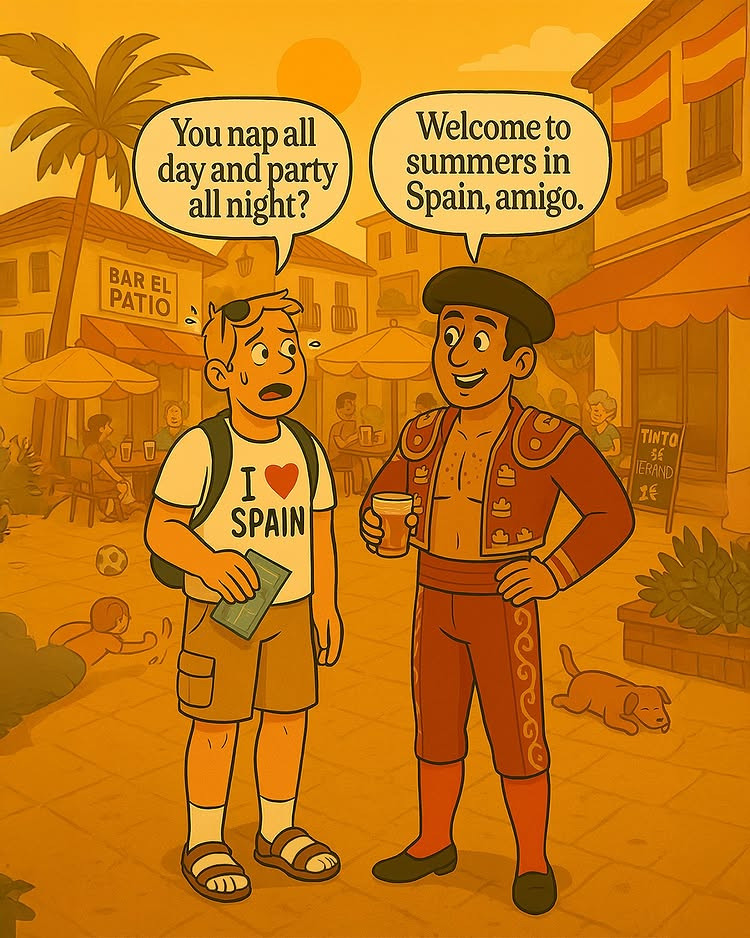
August in Spain: Why Everything is Closed & A Survival Guide
For a newcomer, August in Spain is a kind of cultural baptism. This month can be frustrating at first if you try to live by your old rules. But in the end, it's your first real immersion into the Spanish way of life. A chance to understand firsthand what "working to live" means. If you pass this annual "ritual," you'll take a big step toward feeling at home in Spain.

Imagine it's mid-August in Madrid. You leave your house on a work Tuesday and step into the atmosphere of a quiet Sunday morning. The streets, which were buzzing with cars and people just a couple of weeks ago, are almost empty. Your favorite bakery, where you got your coffee every morning, is closed, and a handwritten sign on the door reads: "Cerrado por vacaciones". You decide to try the bank—same story. After checking its hours online, you're surprised to find that, like most offices, it has long since switched to a shorter summer workday.
What is the "August Exodus"?
The August exodus, or "El Gran Parón" (The Great Pause), isn't just a whim. It's a tradition that has formed for several reasons: the climate, habits, laws, and the culture itself.
- Weather. In the central and southern regions, like Andalusia and Madrid, the summer heat can be simply exhausting.
- School Holidays. In Spain, they last from the end of June to the beginning of September. For parents, taking a vacation in August isn't so much a choice as a necessity to be with their children.
- Work Culture. Many companies, especially in construction and manufacturing, are accustomed to either completely shutting down for a few weeks in August or switching to a shorter workday—jornada intensiva. Productivity drops anyway because many employees are on vacation with their children, so it's easier for businesses to organize a collective break.
- Holidays. The focal point of the month is August 15, the national holiday of the Assumption of the Virgin (Asunción de la Virgen). It serves as an "anchor" around which everyone plans their vacations. Additionally, August is the peak of fiestas patronales—festivals in honor of the patron saints of towns. For many Spaniards, it's a chance to return to their hometown or village (pueblo), meet family, and participate in the festivities.
What to Know About a "Closed" Spain
The famous "Closed for vacation" sign is the first thing a newcomer encounters. But it's important to understand what closes and what doesn't.
What actually closes
First and foremost, it's small and medium-sized businesses. Family-owned bakeries (panaderías), butcher shops (carnicerías), repair shops, small bars and restaurants, and private doctor's offices—many of them may close for a couple of weeks or even the entire month. This is business that serves the locals, and since the locals are away, there's no one to work for.
What stays open (but differently)
Large supermarket chains (Mercadona, Carrefour), big shopping centers (El Corte Inglés), pharmacies (farmacias, often on a rotating duty schedule), and of course, everything in tourist centers, continue to operate. However, almost all of them switch to a summer schedule (horario de verano).
The New Work Rhythm: "Jornada Intensiva" and "Horario de Verano"
This is perhaps the main difference you'll have to get used to. Jornada intensiva is a continuous workday, usually from 8 AM to 3 PM, without a long lunch break. This schedule is implemented in most offices from June to September.
- Banks: The most striking example. Most branches, including giants like Santander or BBVA, switch to a summer schedule and are only open in the morning, typically from 8:30 AM to 2:00 PM. Getting into a bank after two in the afternoon is practically impossible.
- Public Institutions and Post Offices: They also reduce their hours.
For someone used to services being available all day, this means one thing: all important errands must be planned for the morning.
The Bureaucratic Labyrinth and Appointments
If August is a bad time for banking, it's the worst time for bureaucracy. Getting an appointment (cita previa) at government offices, whether it's the immigration office (Extranjería) or social security (Seguridad Social), becomes a real quest.
The reason is simple: many employees are on vacation, working hours are reduced, and the number of applicants doesn't decrease.
A simple tip: Plan all administrative procedures—residency renewal, document applications—well in advance. Ideally, finish everything in June-July or postpone it until mid-September.
Why Vacation in Spain is Sacred
To understand the August paralysis, it's not enough to know the bank schedules. You need to delve into the local mentality. For someone from a country with a strong work ethic, this can be a real eye-opener.
"We Work to Live, Not Live to Work"
This phrase isn't just a pretty aphorism; it's the essence of the Spanish approach to life. Here, leisure (ocio), time with family, and friends are valued no less, and often more, than career achievements. A long summer vacation is not a luxury but a basic right, part of an unwritten social contract. It's a time to recharge, for family, for life.
How to get used to it? Over time, you'll start to see the advantages. The rhythm becomes more relaxed, and stress levels decrease. The secret to adaptation is not to fight the system but to use it to your advantage. August is not a "lost" month for work, but a "found" one for integrating into local life. It's the perfect time to:
- Practice the language in real-life situations: By chatting in beach bars (chiringuitos) or at local festivals (verbenas).
- Explore your "empty" city: Enjoy the absence of traffic and crowds where it's usually packed.
- Travel the country: Take advantage of the lull to get to know Spain better.
- Make social connections: Attend local festivals, get to know your neighbors. The strongest bonds are formed in such informal settings.
A Survival Vocabulary for August
Reading the Signs: "Cerrado por Vacaciones"
-
Cerrado por vacaciones del 1 al 31 de agosto, ambos inclusive.
Translation: Closed for vacation from August 1 to 31, both dates inclusive.
Vocabulary: Cerrado — closed, del... al... — from... to..., ambos inclusive — an important detail, "including both dates".
-
Volvemos el 1 de septiembre.
Translation: We return on September 1st.
Vocabulary: Volvemos — "we will return" from the verb volver (to return).
-
Disculpen las molestias.
Translation: Sorry for the inconvenience.
Vocabulary: A standard polite phrase. Las molestias — inconvenience.
-
Nos vemos a la vuelta.
Translation: See you upon return.
Vocabulary: A friendly, informal phrase. A la vuelta — "upon return".
-
Permaneceremos cerrados por descanso del personal.
Translation: We will be closed for staff rest.
Vocabulary: A more formal option.
Key Concepts of the Spanish Summer
- Jornada intensiva / Horario de verano: A condensed workday (usually 8:00-15:00) to avoid the heat and free up time for rest.
- El puente: "The bridge." This is what they call long weekends that form when a single workday falls between a holiday and a regular weekend, and it's also made a day off.
- Verbena / Fiestas patronales: Traditional street festivals in honor of a town's patron saint with live music (orquesta), dancing, and food.
- Chiringuito: A beach bar or small restaurant. It's a whole cultural phenomenon: you can spend the whole day here, from morning coffee to evening cocktails. In Málaga, you must try the espetos (grilled sardines).
- Tinto de verano: "Summer red wine." Don't confuse it with sangria! This is the most popular summer drink: a mix of red wine and a soft drink (either sweet gaseosa or lemon-flavored con limón).